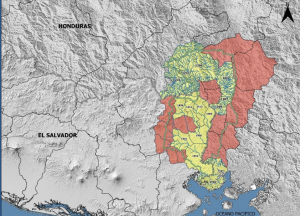
This project is a regional initiative focused on the transboundary watershed of Goascorán which lies between eastern El Salvador and south-western Honduras. The Goascorán watershed, like other areas within the Central American Dry Corridor, is highly vulnerable to climate variability and change, with exposure to extreme weather events and high poverty rates creating specific challenges. The main climatic factors in the region are delayed onset of the rainy season, erratic rainfalls, increasing frequency and intensity of droughts during the growing season, excessive rains and severe flooding. Loss and damages from extreme weather events like tropical storms and hurricanes affect communities in the watershed.
Eighty-five percent of the watershed population lives in rural areas. Households depend on cultivation of maize, sorghum and beans, and livestock raising including small-scale aviculture. Because of the limited agricultural potential of soils, cattle raising remains the primary option to generate income for smallholder producers in the upper and middle parts of the watershed. On both the Honduran and El Salvadoran sides of the watershed, the incidence of malnutrition ranges from moderate to high. Land tenure is a major challenge to achieve food security and strengthen livelihoods’ resilience in the watershed. Women are particularly vulnerable due to lower access to productive assets.
The project’s main goal is to strengthen the climate change adaptive capacity of vulnerable households in the degraded transboundary watershed of Goascorán across El Salvador and Honduras by providing communities with integrated climate risk management tools and services that enhance their resilience to climate variability and change. The project will support the adoption and dissemination of traditional and innovative climate-resilient practices and technologies within a gender-transformative integrated approach.
Groups that will be targeted include smallholder agricultural cooperatives involved in food production and processing, small and medium-sized enterprises (SMEs), Local Development Committees, community leaders, technicians and extension agents, intermediaries in agriculture value chains, participants in farmer field schools, along with educational centers and schools and members of communities in the prioritized municipalities, aiming to benefit 275,000 individuals.
| Project Component 1: Enabling climate vulnerable communities to practice community-based adaptation within an integrated watershed management approach | US$ 6,488,200 |
| Project Component 2: Connecting climate vulnerable populations in the Goascorán watershed to access innovative services that increase their climate risk management capacities | US$ 3,469,100 |
| Project execution cost | US$ 995,700 |
| Total project cost | US$ 10,953,000 |
| Implementing Entity Project Cycle Management Fee | US$ 1,095,300 |
| Grant Amount | US$ 12,048,300 |
Project Documents
| Attachment | Type | Size |
|---|---|---|
| Project pre-concept | 1 MB | |
| Project concept | 4 MB | |
| Project document | 5 MB | |
| Other project order | 330 KB | |
| Other project order | 336 KB | |
| Inception Report | 42 MB |


